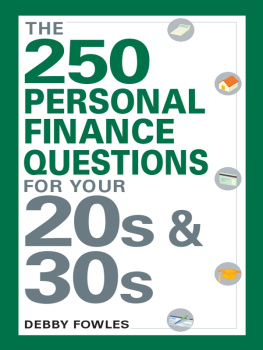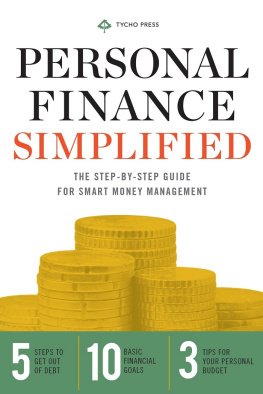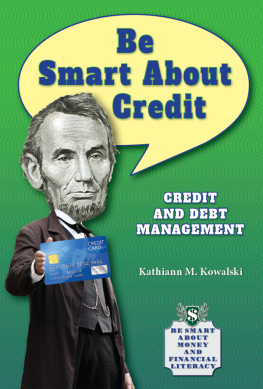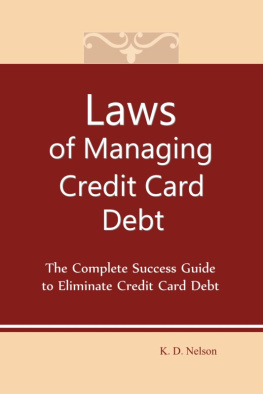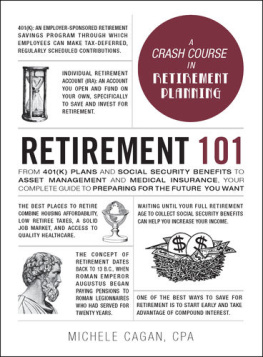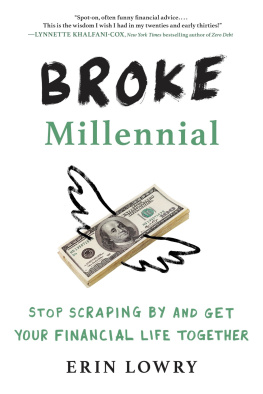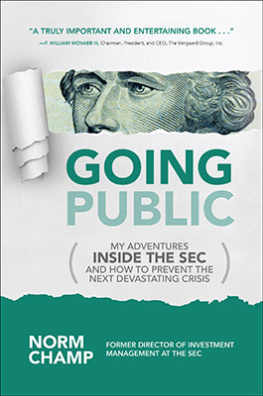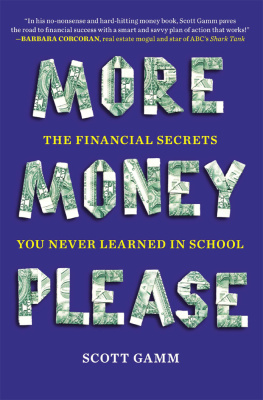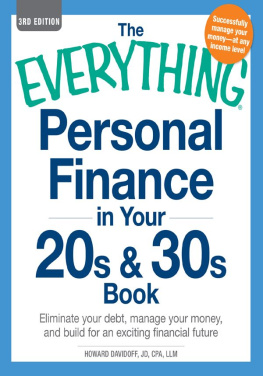
THE
PERSONAL
FINANCE
QUESTIONS
FOR YOUR
s&s
DEBBY FOWLES

Copyright 2009 by F+W Media, Inc.
All rights reserved. This book, or parts thereof, may not be reproduced in any
form without permission from the publisher; exceptions are made for brief
excerpts used in published reviews.
Published by Adams Media, an F+W Media Company
57 Littlefield Street, Avon, MA 02322. U.S.A.
www.adamsmedia.com
Contains material adapted and abridged from The Everything PersonalFinance in Your 20s and 30s Book by Debby Fowles, copyright 2003 by F+W Publications, Inc., and The Everything Personal Finance in Your20s and 30s Book, 2nd Edition by Debby Fowles, copyright 2008 by F+W Publications, Inc.
ISBN 10: 1-59869-863-X
ISBN 13: 978-1-59869-863-3
eISBN: 978-1-44051-834-8
Printed in Canada.
J I H G F E D C B A
Library of Congress Cataloging-in-Publication Data
is available from the publisher.
This publication is designed to provide accurate and authoritative information with regard to the subject matter covered. It is sold with the understanding that the publisher is not engaged in rendering legal, accounting, or other professional advice. If legal advice or other expert assistance is required, the services of a competent professional person should be sought.
From a Declaration of Principles jointly adopted by a Committee of the
American Bar Association and a Committee of Publishers and Associations
Many of the designations used by manufacturers and sellers to distinguish their products are claimed as trademarks. Where those designations appear in this book and Adams Media was aware of a trademark claim, the designations have been printed with initial capital letters.
This book is available at quantity discounts for bulk purchases.
For information, call 1-800-289-0963.
CONTENTS
INTRODUCTION
How do you learn how to save money and make it grow? How do you evaluate offers and deals and make wise choices? If you practice the basic personal-finance guidelines and concepts outlined in this book, you can become financially savvy and financially secure.
You can learn to avoid the financial mistakes that can have such a negative impact on your future and your relationships. The book will show you how to live more simply, save more money, spend less, avoid impulse spending and credit card debt, stick to a realistic spending plan (budget), and plan for your retirementwithout making huge sacrifices while youre doing it.
Your twenties are the best time to develop good personal-finance habits, before you get into debt that youd have to struggle to pay off or make other financial mistakes that youd spend years recovering from. In your thirties, its still not too late to turn your financial life around if youre not on the right track.
There is little thats more rewarding than seeing your financial goals and dreams becoming a reality. Controlling your money instead of letting your money control you gives you a sense of empowerment and self-esteem. Watching your investments grow and knowing you have a nest egg to fall back on gives you a sense of security. In the end, you dont really give up anything of lasting importance. You gain everything that really matters to you.
If youre not too deeply in debt yet, your rapid progress will be its own reward. If you are deeply in debt, youll have to work at it harder and longer, but it can be work thats empowering, stress relieving, and even fun. It all comes down to balance and making smart decisions about money. It gets easier with practice and is hugely rewarding, both financially and emotionally. Why not get started now?
PART I
Getting Started
Chapter 1
SETTING GOALS
YOU WOULDNT START out on a long trip into unfamiliar territory without a road map, yet many people go through life without a concrete plan for their financial future. The road to financial freedom can lead directly to your destination or to a dead end. Specific financial goals and written plans for meeting them help you focus your efforts on the end result.
Goals are like the wheels on your car; they keep you moving in the direction you want to go, and you wont get very far without them. If you havent already started planning for your future, nows the time to begin, no matter what your age. If youre in your twenties, however, you have a distinct advantage. Saving and investing in your twenties will give you the most powerful financial tool available: time. Youll have to work at it a lot harder if you start later in life. In fact, the smartest thing you can do in your twenties is save and invest. Ultimately, youll have to save and invest a lot less money at a time and will still come out far ahead of the person who starts a decade or two later.
Question 1: Why do I need to set financial goals?
All successful organizations have short- and long-term goals and a written plan for reaching them, and if you want to be financially successful, so should you. The first steps are to determine your financial status today and then decide what you want to achieve for your future and how youre going to accomplish it. Starting in your twenties is a huge advantage. If you invest $5,000 at the age of twenty, and it earns 7 percent per year, at retirement (age sixty-five) it will total over $115,000. The same amount invested at the age of forty would total less than $29,000. As the saying goes, Most people dont plan to fail, they just fail to plan. Without planning, even the best of intentions lead nowhere. Start mapping out your route now. Your entire future depends on it.
Question 2: What should I do first?
As with any road map, before you can determine how to get from here to there, you need to know where here is. Where do you stand financially? Answering this critical question is the job of the net worth statement. The net worth statement is very simple in concept. Your net worth is the difference between all the things of value that you own and all the debts you owe, or in financial terms, your assets minus your liabilities. Your net worth statement is a list of each of these items and their current value or balance.
Question 3: Why do I need a net worth statement?
The net worth statement gives you a snapshot of your financial condition at this moment in time. You need this information in order to effectively set the financial goals that youll be working toward, assess your progress along the way, and make adjustments, using the important clues gleaned from updating your net worth statement on a regular basis. It will also come in handy when applying for a mortgage, credit card, or car loan.
Sometimes people avoid making a list of their debts because theyre afraid they wont like what they find or they believe they already have a good gut feel for their overall financial picture. However, burying your head in the sand like the proverbial ostrich wont get you far, and gut feelings can be way off the mark. Not having a handle on your financial condition can seriously hurt you in a time of crisis, like a job loss or disability, and its difficult if not impossible to plan for the future if you dont know where you are today.
Question 4: How do I create my net worth statement?
Start by listing all the things of value that you own, even if you owe money on them, like your house and cars. Use their full value as of today. The balances of the loans related to these assets will be included in the liabilities section, so your equity in the assets you list wont be overstated. For bonds, stock options, and retirement accounts, use the current value, not the value at maturity or the value on the date youre fully vested.
Next page
